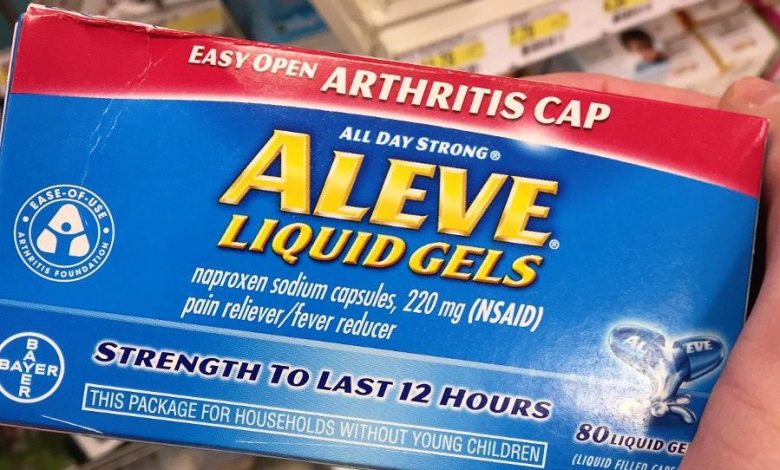Is It Safe To Take Aleve Every Day For Arthritis?

Arthritis is a chronic condition characterized by inflammation and pain in the joints, affecting millions of people worldwide. To alleviate the discomfort and improve quality of life, various treatment options are available, including non-steroidal anti-inflammatory drugs (NSAIDs) like Aleve (naproxen).
Aleve is a widely used over-the-counter medication renowned for its effectiveness in managing arthritis symptoms. However, as with any medication taken regularly, concerns arise about its long-term safety and potential side effects. This article aims to explore the safety of taking Aleve every day for arthritis, examining its benefits, risks, and alternative approaches to managing the condition.
Understanding Aleve and its Mechanism of Action
Aleve contains the active ingredient naproxen, which falls under the NSAID category. NSAIDs work by inhibiting the production of prostaglandins, hormone-like substances responsible for pain, inflammation, and fever. By doing so, Aleve can reduce pain and inflammation in arthritis-affected joints, providing much-needed relief to patients.
Benefits of Daily Aleve Usage for Arthritis
When used as directed and for short-term relief, Aleve can be highly effective in managing arthritis symptoms. Some of the key benefits of daily Aleve usage for arthritis include:
1. Pain Relief: Aleve offers significant pain relief for arthritis sufferers, allowing them to perform daily activities with reduced discomfort.
2. Anti-inflammatory Effects: The drug’s ability to reduce inflammation can lead to decreased joint swelling and increased joint mobility, further enhancing the patient’s quality of life.
3. Increased Functionality: By alleviating pain and inflammation, Aleve may help arthritis patients regain functionality and improve overall joint function.
4. Convenience: Being an over-the-counter medication, Aleve provides a readily accessible option for individuals with mild to moderate arthritis, making it a convenient choice for daily use.
Is It Safe To Take Aleve Every Day For Arthritis?
No, taking Aleve daily for arthritis management carries several risks and potential side effects which can include:
1. Gastrointestinal Complications: Daily Aleve usage can irritate the stomach lining, potentially leading to gastrointestinal issues such as stomach ulcers, bleeding, and gastritis.
2. Cardiovascular Risks: Long-term and high-dose NSAID use, including Aleve, has been associated with an increased risk of cardiovascular events, such as heart attack and stroke.
3. Kidney Function Impairment: Prolonged usage of Aleve may negatively impact kidney function and cause kidney-related issues.
4. Interaction with Other Medications: Aleve can interact with certain medications, including blood thinners and other NSAIDs, leading to adverse effects.
5. Allergic Reactions: Some individuals may be sensitive or allergic to naproxen, resulting in skin rashes, hives, or difficulty breathing.
The Importance of Proper Usage and Medical Supervision
Given the potential risks associated with long-term Aleve usage, it is crucial for individuals with arthritis to follow these guidelines:
1. Medical Consultation: Before incorporating Aleve into your daily arthritis management routine, consult with a healthcare professional. They can assess your condition, medical history, and potential interactions with other medications to determine if Aleve is appropriate for you.
2. Correct Dosage: Adhere to the recommended dosage and avoid exceeding the daily limit to minimize the risk of side effects.
3. Short-term Usage: Ideally, Aleve should be used for short periods at the lowest effective dose to manage arthritis flare-ups, rather than as a long-term solution.
4. Alternating Medications: If you find yourself needing daily pain relief for an extended period, consider alternating between different NSAIDs or exploring other pain management options to reduce potential risks.
5. Regular Check-ups: Regularly monitoring your health and seeking medical advice if you experience any concerning symptoms can help catch and address complications early on.
Alternative Approaches to Arthritis Management
Apart from Aleve and other NSAIDs, several alternative approaches can complement arthritis management:
1. Physical Therapy: Engaging in targeted exercises and stretches prescribed by a physical therapist can help improve joint function and reduce pain.
2. Lifestyle Modifications: Maintaining a healthy weight, adopting an anti-inflammatory diet, and avoiding activities that exacerbate joint pain can significantly impact arthritis symptoms.
3. Heat and Cold Therapies: Applying heat or cold to affected joints can help reduce inflammation and soothe pain.
4. Topical Creams: Topical NSAID creams and gels can provide localized relief without impacting the whole body system.
Conclusion
In conclusion, Aleve can be an effective tool in managing arthritis symptoms when used judiciously and under medical supervision. Its pain-relieving and anti-inflammatory properties can significantly improve the quality of life for arthritis sufferers. However, long-term daily usage of Aleve carries potential risks, including gastrointestinal complications, cardiovascular concerns, and kidney issues. To ensure the safest and most effective arthritis management, individuals should consult with a healthcare professional, adhere to recommended dosages, and explore alternative approaches that complement the use of Aleve. By maintaining a balanced approach to arthritis management, patients can find relief while minimizing potential risks and side effects associated with daily Aleve consumption.





